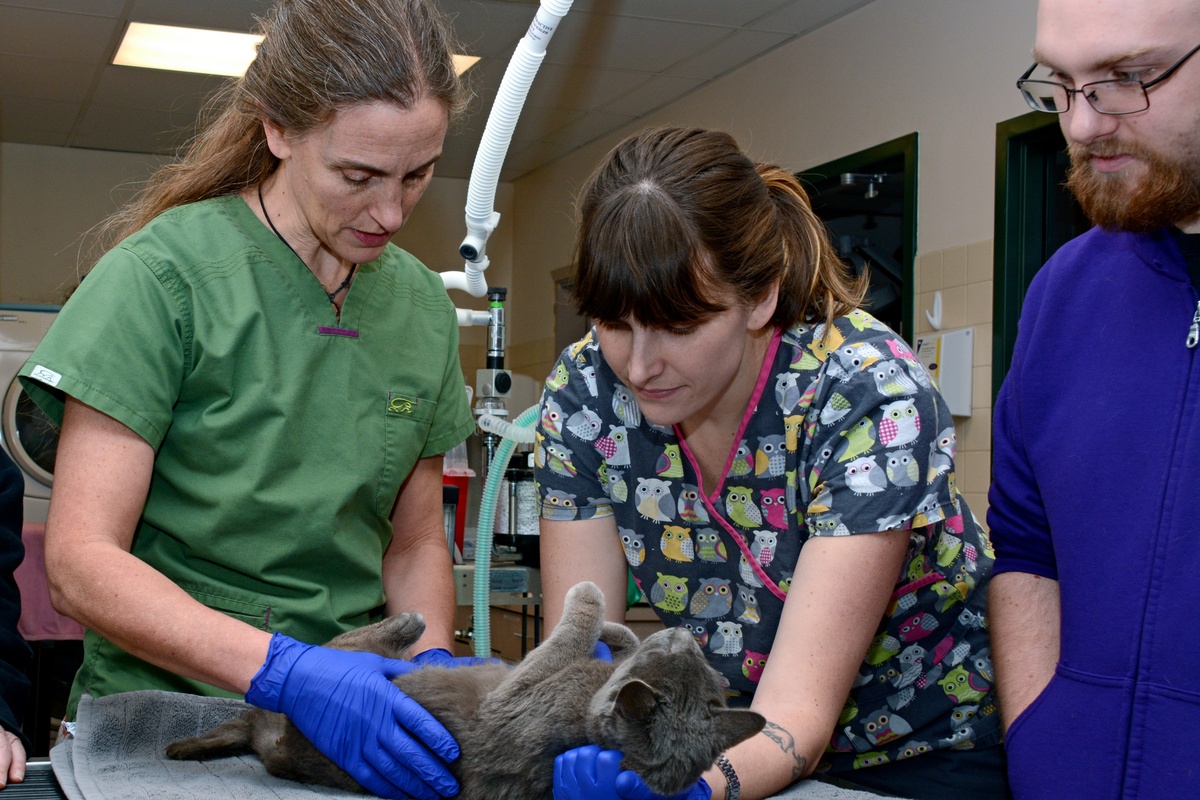$1.3M in grants, gifts fund creation of animal shelter medicine program

Clinical Assistant Professor Sandra Newbury (left) works with Dane County Humane Society-University of Wisconsin Maddie’s Shelter Medicine Intern Laura Balanoff and admitting technician Jason Dunkel.
Photo: Nadine Nassif
The numbers are staggering.
Each year, shelters across the country take in anywhere from 4 million to 8 million animals, and each year, 2 million to 5 million of those animals die, according to the most recent estimates from the Humane Society of the United States.
“There is no affliction among companion animals that even approaches the level of mortality associated with animal homelessness,” says Sandra Newbury, clinical assistant professor of shelter medicine at the University of Wisconsin–Madison School of Veterinary Medicine (SVM).
“Veterinarians are uniquely positioned to support the incredible efforts of shelters by educating (people) about shelter animal health and well-being, as well as the underlying complexities that contribute to this devastating problem.”
Sandra Newbury
Many of these deaths occur despite the efforts of well-meaning animal lovers, often due to lack of information — a problem Newbury is working to address in her role as director of the new SVM Shelter Medicine Program, which was created after the school raised more than $1.3 million in grants, outright gifts and pledges to help fund it into the future.
“Veterinarians are uniquely positioned to support the incredible efforts of shelters by educating (people) about shelter animal health and well-being, as well as the underlying complexities that contribute to this devastating problem,” Newbury says. “It’s so important for us to be involved now and to train future veterinarians to expand and continue that support.”
Shelter medicine focuses on improving the well-being of homeless animals by working closely with shelters to support their work, help them learn from their experiences, and expand their knowledge base. This includes investigating new ways to manage at-risk animal populations; conducting clinical research that improves shelter care and treatment; setting standards for shelters; and training shelter staff, practicing veterinarians, and veterinary medical students in best practices.
Newbury joined the SVM in November 2014 with an impressive track record in these areas. As a national extension veterinarian with the Koret Shelter Medicine Program (KSMP) at the University of California, Davis, School of Veterinary Medicine, she helped shelters across the U.S., Australia, Canada and Europe manage disease outbreaks and dramatically increase live release rates. She is also chair of the Shelter Standards Task Force for the Association of Shelter Veterinarians and co-authored the organization’s “Guidelines for Standards of Care in Animal Shelters.”
At UW–Madison, she will oversee shelter medicine training for veterinary medical students at the SVM, which will involve a shelter medicine rotation, an elective course, a weeklong intensive “selective” course, clinical studies, consultation experiences and externships, and a student shelter medicine club.
“We hope the outcome of our gift is a better understanding among new veterinarians of the special challenges facing shelters and rescue groups and how each of them can make a difference helping these organizations.”
Jeff Wiesner
These efforts expand upon many years of shelter medicine work at the SVM, where faculty, staff and students have made major contributions to the field. Ronald Schultz, professor of pathobiological sciences, is nationally recognized for developing the shelter vaccine guidelines that have been used nationwide for the last 15 years.
“We have a long tradition of working to make the lives of shelter animals better,” says SVM Dean Mark D. Markel. “The school is dedicated to training our students in this very important field and enhancing their hands-on skills and understanding of the importance of giving back to the community. This influx of funding gives us our first opportunity to truly formalize and focus those efforts.”
In addition to Newbury’s position, the new funds will be used to hire an outreach veterinarian, a clinical research assistant, and a program manager. The funds will also support three fellowships for practicing shelter veterinarians in the program’s first year and enhance online resources for shelters, which are offered in collaboration with KSMP.
Jeff and Sara Wiesner pledged $500,000 to the program over the next decade. The couple has been active in shelter and canine rescue efforts for years, and Jeff Wiesner says they have seen the impact that caring veterinarians can have in supporting homeless animals.
“We appreciate the capabilities of the UW School of Veterinary Medicine, where we have sought treatment for complex issues with foster dogs and our own pets,” he says. “We hope the outcome of our gift is a better understanding among new veterinarians of the special challenges facing shelters and rescue groups and how each of them can make a difference helping these organizations.”



